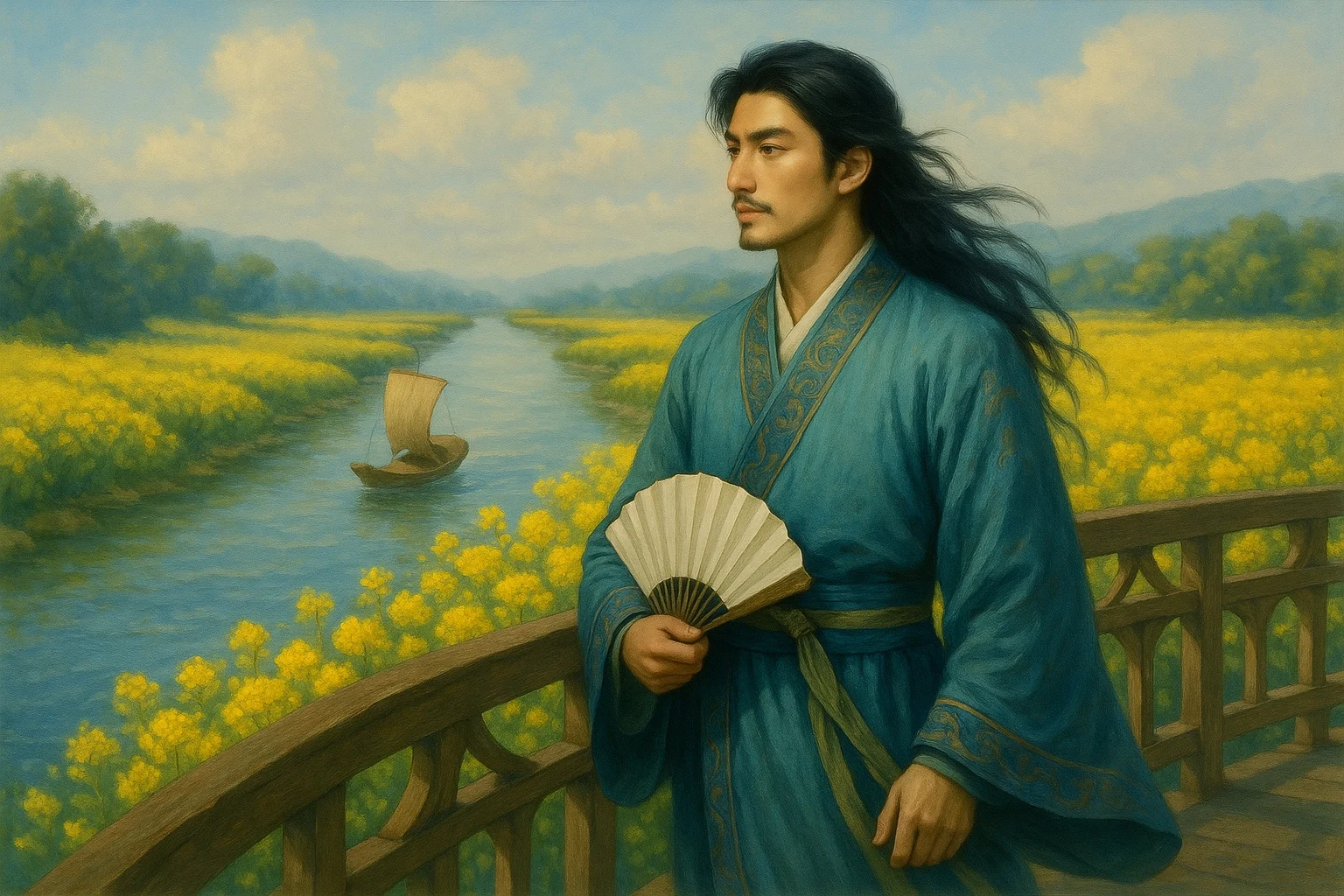I cherish your untrammeled soul—
Through cloud-wrapped peaks you wander free.
Your form dissolves in distant knolls,
Your lone boat drifts with laughing spree.
Worldly affairs scarce stir your heart,
Fishermen’s huts host your brief stay.
Where reeds bloom pale, set far apart,
What can the river-moon do but gaze?
Original Poem
「送苏修游上饶」
崔峒
爱尔无羁束,云山恣意过。
一身随远岫,孤棹任轻波。
世事关情少,渔家寄宿多。
芦花浅淡处,江月奈人何。
Interpretation
This poem was written by Cui Dong as he bid farewell to his friend Su Xiu, who was departing for Shangrao (in modern Jiangxi). Clearly a free spirit drawn to nature, Su Xiu inspired Cui Dong to paint both the journey's scenery and his friend's character in verse—expressing admiration and reluctance, while channeling his own yearning to transcend worldly ties and embrace reclusion. The language is lucid and unadorned, the mood serene yet expansive, celebrating the untrammeled joy of wandering and a philosophy of detachment.
First Couplet: "爱尔无羁束,云山恣意过。"
Ài ěr wú jī shù, yún shān zì yì guò.
I love your untethered soul—
Through cloud-wrapped peaks you roam at will.
The opening praises Su Xiu’s unrestrained nature. Cloud-wrapped peaks (云山) symbolize both the physical landscape and boundless freedom, while at will (恣意) underscores the friend’s defiance of convention. The poet’s admiration for this lifestyle shines through.
Second Couplet: "一身随远岫,孤棹任轻波。"
Yī shēn suí yuǎn xiù, gū zhào rèn qīng bō.
A lone figure trails distant ridges;
A single oar yields to calm waves.
Here, the journey takes shape: the friend becomes a lone figure against mountain silhouettes, his boat drifting with the current. The parallelism of trails (随) and yields (任) mirrors harmony between traveler and nature—a quiet dynamism within tranquility.
Third Couplet: "世事关情少,渔家寄宿多。"
Shì shì guān qíng shǎo, yú jiā jì sù duō.
Worldly affairs stir you little;
Fisherfolk’s huts host you often.
The focus shifts to attitude. Stir you little (关情少) reveals Su Xiu’s indifference to fame, while fisherfolk’s huts (渔家) highlight his humble, nature-rooted lodgings. The lines bridge external journey and internal ethos.
Fourth Couplet: "芦花浅淡处,江月奈人何。"
Lú huā qiǎn dàn chù, jiāng yuè nài rén hé.
Where reeds bloom pale and sparse,
What can the river moon do to keep you?
The close merges scene and sentiment. The pale reeds (芦花) and river moon (江月) frame a ethereal, fleeting beauty. What can…do (奈人何) laments the friend’s inevitable departure, blending wistfulness with reverence for his unrestrained path.
Holistic Appreciation
Though framed as a farewell poem, this work is devoid of lamentation, instead brimming with yearning for unfettered living and admiration for a friend's character. The poet dissolves parting sentiments into landscapes, softening emotional tension while amplifying poetic ethereality and naturalness. The opening couplet immediately establishes Su Xiu's "unrestrained" persona, setting the tone of "freedom" and "wandering" that permeates the entire poem. The second couplet continues the journey motif, sketching travel scenes through "distant peaks" and "gentle waves" that create vivid imagery through dynamic stillness. The third couplet introduces life philosophy and lifestyle choices, revealing the poet's resonance with transcendent living. The closing lines conclude with scenery absorbing emotion, capturing the faint melancholy of parting while maintaining transcendent composure.
This fusion of scenery and lyricism exemplifies Cui Dong's signature style—fresh and uncluttered with restrained emotion—while showcasing a spiritual demeanor that rises above worldly concerns.
Artistic Merits
The poem's defining feature is its "emotion embedded in scenery, meaning dwelling in nature." Though a farewell, it avoids painful parting sentiments, instead painting a portrait of transcendent ease through journeying, landscapes, and life details. The language is plain and unadorned yet refreshingly natural, with far-reaching artistic conception. Elements like "cloud-wrapped mountains," "distant peaks," "gentle waves," and "reed catkins" enhance the poem's visual and ethereal qualities, creating strong sensory and emotional resonance.
The closing line "what can the river moon do to us?" lingers with endless aftertaste—simultaneously conveying parting tenderness and the resolute serenity of life as an inevitable journey, rich in profound meaning.
Insights
This poem enlightens us: true freedom lies not in physical distance traveled but in spiritual liberation and composure. Su Xiu's wandering represents both geographical movement and a conscious choice of inner world—rejecting worldly fetters to embrace landscapes, lodging with fishermen, heart unburdened. In bidding farewell, Cui Dong doesn't cling desperately but regards the separation with appreciative blessings, revealing a gentle yet lucid philosophy of life. This emotional approach remains resonant today, mirroring contemporary society's pursuit of personal freedom and self-worth.
About the Poet

Cui Dong (崔峒, dates of birth and death unknown), a Tang Dynasty poet from Anping, Hebei, was active during the Dali era (766 - 779). Along with Sikong Shu, Lu Lun and others, he was known as one of the "Ten Talents of Dali." His poetry primarily consists of five-character regulated verse (wulü), characterized by an elegant and subtle style. The Complete Tang Poems preserves 48 of his works. His poetic style resembles Liu Changqing's but appears more solitary and austere, reflecting the transition from the vigorous grandeur of High Tang poetry to the introspective quality of Dali-era verse.










